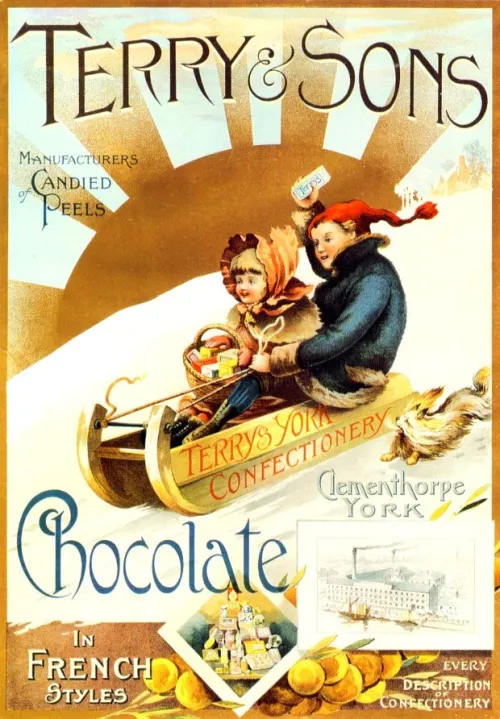The idea of love and spirituality in business has been present throughout history. Moreover, in case you are wondering, love and compassion have been extremely successful in business.
There is a tendency in this modern cynical world to believe love is expendable and may be costly, meaning you will lose out on profits if you get “soft” and start being nice to people. Promoting love makes you a loser.
But that’s really not true. Many big corporations, even banks, dating back to the 18th and 19th century, were originally founded on loving and spiritual principles.
For example the early huge British chocolate companies, Cadbury, Fry, Terry and Rowntree enterprises were founded by Quakers and run on far more compassionate principles than we would consider normal in business today.
 Terry was an English quaker family dynasty
Terry was an English quaker family dynasty
The whole industrial revolution actually sprang from Quaker involvement in England’s iron and steel industry. The world’s first railways, in northern England, were also owned and funded by Quakers, notably the Pease family. In a sense, Quakers launched Mankind’s greatest revolution!
So don’t tell me love and caring doesn’t work; it would if people practiced the art. It’s shameful to me that people believe that the values of love and caring make you a sucker and that you would automatically be targeted by ruthless, wicked and dishonest people.
Let me say something about the women too. The Society Of Friends have always regarded women as equals and accepted them as ministers. This is in stark contrast to orthodox Christianity.
Well, I’m not recruiting for the Quakers, so enough of that. Let’s move on.
Quantum Loving
Here’s an interesting thing. This is from a great friend, the late Buryl Payne. He talks about his quantum theory of love. I like it!
A lot of people bandy about the word quantum, without having the faintest idea what it means. A quantum (plural quanta) is a tiny packet of energy, the smallest “something” you can have almost. Except it isn’t a something, like a particle, it’s a wave. No, it’s a particle! No it’s a wave. It’s both! Even the physicists can’t sort it out.
But start with the idea of a quantum as the tiniest packet of anything; the smallest something that isn’t nothing! In the quantum theory of love, what’s the smallest particle of love? You decide. But Buryl suggested a smile maybe. Could it be a kiss? A hug?
Well, to me, it would be a thought wave. I little flicker or feeling that sent love and positiveness towards something. If an atom bomb of love goes off, of course, e=mc2 means that there will be gushings of love energy. I’m sure you’ve had that feeling, where love grips you to the depths of your soul or, as Elizabeth Barret Browning put it:
to the depth and breadth and height the soul can reach, when feeling out of sight for the ends of being and ideal grace… [Sonnets from The Portuguese #43]
But—back to the smallest particle of love—go figure and let me know what you think.
The Mathematics Of Love
This is a bit tongue in cheek. Again it’s from Buryl Payne. He talks about “gain”, a physics term that radio buffs use. It’s a knob on your amplifier. Most of us would call it volume but gain isn’t quite the same. Never mind.
For the most part, well balanced human beings act like love amplifiers. In electronics, amplifiers convert an input current to an output current. With a given input current, the gain, or volume, determines how large the output current will be.
In interactions with each other, most human beings seem to operate with a gain of about one. That is, they do as asked, sometimes a little more, and sometimes a little less. Extremes exist, of course. We all know and feel uncomfortable around the minus 2 and 3s. It’s wonderful to be with a plus 2 or 3 or 5 even!
But when we look around at people in general, we see that some people are operating with a love gain factor just slightly less than one. That is, they often are a little bit unfriendly, don’t always return a smile, and leave a place a little bit dirtier than when they came, or are apt to take advantage of a situation in a selfish way. They usually do not do this deliberately; just unconsciously.
Let’s turn this into some phoney but delicious math!
The process can be described by the difference between 1 x 1 x 1 x 1.., which is always equal to 1, no matter how many times the multiplication is carried out, and 0.9 x 0.9 x 0.9 x 0.9…, which equals 0.66 after only four times. If there are a lot of .9 people, the result of continued interactions with them will be close to zero.
And that’s what we experience, isn’t it? If we are surrounded by lots of people who may be only a little off positive, the combined effect soon multiplies and we find ourselves down to zero energy. Inertia. That’s what committees do; groups.
One key rule to success is plough your own furrow. It doesn’t mean do it alone. But it does mean you have to be king (or queen) or your own domain. Too many decision makers and there are no decisions at all, just dissent.
Buryl’s math is very compelling: even if there are millions of people operating at a gain of only 0.9999999—very, very slightly negative—the eventual outcome of millions of interactions will still approach zero—and that’s what planet earth is suffering from right now.
On the other hand if each transaction has a gain of only 0.01, a really tiny amount, after just 200 transactions the total of love has DOUBLED. The Earth needs lots of 1.01s, not 0.9s, to survive.
Buryl’s formula even I can follow. Let q = a quantum (smidge) of love. If it’s a negative quantity that means a little bit of love subtracted.
So (1+q)n just gets bigger and bigger; while (1-q)n just gets smaller and smaller and will eventually become zero. It doesn’t matter what size n is. N is just the number of interactions.
So to start this formula working for the good of all, for your own good, for your own success, for the happiness of self and others AND the survival of our fragile world: just add a minimum tiny quantum of extra love AND TEACH EVERYONE ELSE YOU COME ACROSS TO DO THE SAME.
You’ll be surprised what comes back to you.
The “Love” Generation
I’m a proud 60s Boomer. We believed in love. We thought it would change the world. It didn’t… or hasn’t yet. But I still believe it can. The Love Movement got itself corrupted by drugs and crazy behaviors, notably among celebrities and leaders. Drugs take away freedom and awareness, they do not create it where it does not exist. And it’s a fact, no matter how good your core philosophy, that if people are left stupid, dysfunctional, ignorant and emotionally inept, your social philosophy will not work.
That’s why in my Transformational Psychology we have a strong emphasis on freeing people from their automatic, subconscious, self-destruct behaviors. That’s another story for another training.
But you could have a week-long “love fest”! You don’t have to take any clothes off, as we did as youngsters during the “Summer Of Love” years. But pour it out for seven whole days, non-stop, and see what comes back.
You’ll be amazed!
And if you get a good result, why stop? They say it takes 30 days to create a new habit. Keep it up for that long and enjoy a new life. Ebenezer Scrooge from Charles Dickens’ “Christmas Carol” did!
Try a version of Anne Herbert’s Random Acts Of Kindness And Senseless Beauty …
Do something outrageously kind for others with no expectation of anything in return. Maybe unexpectedly treat the colleague ahead of you in the cafeteria line to lunch. Just for the heck of it. Throw surprise parties for people. Buy flowers for the office and share them. Let someone cut in before you in traffic.
All this can be practiced in the workplace too. Individuals at all levels of an organization welcome being treated as a full person, not just a workmate or a phone extension, or an email address. People are not inventory items! Show them love and respect. They’ll respect and love you for it, in return.
To Your Good Health,Prof. Keith Scott-Mumby
The Official Alternative Doctor





